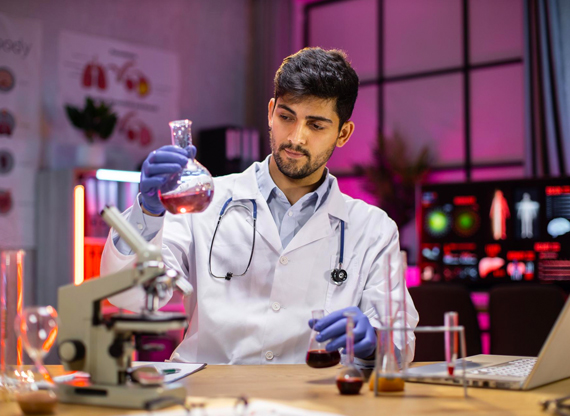PO1: Pharmacy Knowledge:
Possess knowledge and comprehension of the core and basic knowledge associated with the profession of pharmacy, including biomedical sciences; pharmaceutical sciences; behavioural, social, and administrative pharmacy sciences; and manufacturing practices.
PO2: Planning Abilities:
Demonstrate effective planning abilities including time management, resource management, delegation skills and organizational skills.Develop and implement plans and organize work to meet deadlines.
PO3: Problem analysis:
Utilize the principles of scientific enquiry, thinking analytically, clearly and critically, while solving problems and making decisions during daily practice. Find, analyse, evaluate and apply information systematically and shall make defensible decisions.
PO4: Modern tool usage:
Learn, select, and apply appropriate methods and procedures, resources, and modern pharmacy-related computing tools with an understanding of the limitations.
PO5: Leadership skills:
Understand and consider the human reaction to change,motivation issues, leadership and team-building when planning changes required for fulfilment of practice, professional and societal responsibilities. Assumeparticipatory roles as responsible citizens or leadership roles when appropriate to facilitate improvement in health and wellbeing.
PO6: Professional Identity:
Understand, analyse and communicate the value of their professional roles in society (e.g. health care professionals, promoters of health, educators, managers, employers, employees).
PO7:Pharmaceutical Ethics:
Honour personal values and apply ethical principles in professional and social contexts. Demonstrate behaviour that recognizes cultural and personal variability in values, communication and lifestyles. Use ethical frameworks; apply ethical principles while making decisions and take responsibility for the outcomes associated with the decisions.
PO8: Communication:
Utilize the principles of scientific enquiry, thinking analytically, clearly and critically, while solving problems and making decisions during daily practice. Find, analyse, evaluate and apply information systematically and shall make defensible decisions.
PO9: The Pharmacist and society:
Apply reasoning informed by the contextual knowledge toassess societal, health, safety and legal issues and the consequent responsibilities relevant to the professional pharmacy practice.
PO10: Environment and sustainability:
Understand the impact of the professional pharmacy solutions in societal and environmental contexts, and demonstrate the knowledge of, and need for sustainable development.
PO11: Life-long learning:
Recognize the need for, and have the preparation and ability to engage in independent and life-long learning in the broadest context of technological change. Self-assess and use feedback effectively from others to identify learning needs and to satisfy these needs on an ongoing basis.

 NEHRU COLLEGE OF PHARMACY
NEHRU COLLEGE OF PHARMACY